Most fires in the home start accidentally and the consequences can be devastating. Lancashire Fire and Rescue’s safety advice can help keep you safe from fire at home:
- Make sure that you have at least one working smoke alarm in your property and check it regularly to ensure it is still working properly.
- Know your escape route/plan should a fire occur. You never know when a fire might accidentally break out.
- Never leave cooking unattended – take pans off the hob if you get distracted or called away.
- Put cigarettes out carefully before going to bed and don’t smoke in bed.
- Keep candles away from items that could catch fire and be sure to blow them out before going to bed or leaving your home.
- Don’t overload extension leads or adapters and check wires to ensure they’re in good working order.
In the event of a fire, get out, stay out and call 999
If you would like to receive a free Home Fire Safety Check Service from Lancashire Fire and Rescue, call 0800 1691125 or book online: https://www.lancsfirerescue.org.uk/contact/home-fire-safety-check
Lancashire Fire and Rescue Service website: https://www.lancsfirerescue.org.uk/.
Cooking Safely at Home
From ovens and grills to hobs and microwaves, many of the appliances in our kitchens can cause fires. One of the major risks is leaving frying pans or grilling food unattended. Distractions such as the doorbell or your children/pets can take your mind off your cooking. Don’t forget that fires can start in a flash.
There are a few simple things you can do to make cooking as safe as possible:
- Avoid leaving saucepan handles sticking out – children can grab them, or you might knock it off the hob.
- Be wary of loose-fitting clothing when cooking.
- Keep tea towels and dishcloths away from any heat sources.
- Make sure the oven or hob is off when you’re done.
- Do not leave cooking unattended. If you must leave the room, turn the hob off.
- Keep all cooking appliances clean and in good working order.
- Do not use grills or ovens as storage space when not cooking.
- If you’ve been drinking or using drugs, order a takeaway rather than cooking.
- Use a timer while cooking to alert you when a set time is up. This can help remind you to turn off the heat.
Smoking Safety
Smoking is among the highest causes of fire fatalities in the UK. This is because many people who smoke inside do so because they have reduced mobility; if you can’t get outside to smoke, you might not escape from a fire.
Naked flames of any kind can quickly start a fire if they touch fabrics like clothing or soft furnishings. Lighters, lit cigarettes, and hot ashes can all set flammable materials alight. If you smoke inside, you are placing sources of ignition right next to potential fuel.
These risks are much higher if you smoke in bed because you might fall asleep with a lit cigarette in your hand. People lying in bed are also unable to escape a fire as quickly.
Whether you smoke cigarettes, cigars, pipes, or anything else, it is safer and healthier to quit.
If you must smoke, we recommend you follow this advice:
- Use an ashtray for your hot ashes and cigarette butts.
- Take care when emptying your ashtray. Preferably, submerge all ashes so they’re damp before binning them.
- Never throw butts off a balcony or out of a moving vehicle.
- Never smoke in bed or in an armchair in case you fall asleep.
- Consider only smoking outside to reduce your risk of a fire.
- Never smoke near oxygen tanks, fuel, or flammable materials.
E-cigarette Safety
Many people switch to using e-cigarettes (or vapes) to help them stop smoking. Vapes are usually cheaper than cigarettes, so others choose to switch and save money. But these products can also represent a fire risk.
This is especially true if they’re not used properly, or if they’re charged or disposed of in an incorrect way.
Here are our top safety tips for using e-cigarettes:
- Buy them only from reputable retailers.
- Take care that you do not purchase counterfeit goods.
- Read all the instructions before you use the e-cig.
- Keep all vaping paraphernalia out of reach of children and pets.
- Do not vape near oxygen or fuel tanks.
- Never throw spent e-cigs in the bin. Take them to a recycling point.
Using Candles Safely
Lighting candles can be beautiful and create a lovely ambience in your home. However, because they burn with a naked flame, they can easily start a fire.
We recommend using flameless candles – which use LEDs – instead of lighting traditional candles.
If you must light a candle, here are some steps you can take to make them safer:
- Never leave a lit candle unattended.
- Place them in a proper candle holder.
- Use a heat-resistant mat underneath the holder, such as a placemat.
- Keep the flame well away from flammable materials like rugs, carpet, or curtains.
- Never move a lit candle.
- Keep all candles out of reach of children or pets.
- Extinguish all candles before you leave the room or go to sleep.
- Do not place them on the side of the bath – bathtubs can melt due to the heat.
BBQ and Chiminea Safety
These pieces of equipment burn very hot and can cause burns or start a fire. Please follow our advice to protect yourself and your loved ones.
- Use only firelighters or kindling to start the fire, never accelerants like petrol.
- Burn only kindling, coals or wood, never plastic or other waste items.
- If using a gas barbecue, make sure all its joints and connections are sound and in good working condition.
- Keep a ‘safe zone’ around the heated device where children and pets are not allowed.
- Never leave it unattended while lit.
- Supervise the area at all times, especially if children and animals are present.
- Do not consume excessive amounts of alcohol while in charge of a fire.
- Use the device only for its intended purpose and in accordance with its official instructions.
Staying Safe around Bonfires
We recommend not having a bonfire in your garden. They can easily get out of hand and cause a risk to life.
There are lots of organised bonfire events each year, with full safety precautions taking place in advance.
Professional events will have full risk assessments in place, with things like escape routes, first aid, emergency firefighting equipment to hand. Organisers also alert the local council and emergency services of the event, so that we are aware it’s happening. This difference with holding your own is that the fire can get out of hand and become very dangerous.
You can find local organised bonfires online in the lead-up to Bonfire Night.
If you must have a bonfire, please follow these tips:
- Tell your neighbours about your plans. This can help to stop unnecessary 999 calls.
- Don’t build it too far in advance – leaving material lying around can encourage antisocial behaviour.
- Keep the fire well away from fences and sheds.
- Do not build the fire under any trees or bushes.
- Check there are no children or animals hiding in the bonfire before you light it.
- Place a barrier around the fire and keep everyone at least 5m away when it’s lit.
- Only burn untreated wood and not any rubbish or other items.
- Do not use accelerants such as petrol to light the fire.
- Keep a bucket of water nearby just in case.
If the fire gets out of hand, call 999 and ask for the fire service straight away.
Mobility and Fire Safety
If you or someone you live with has mobility issues you may need to take some additional fire safety precautons, as escaping from a fire could take more time.
We have put together this page of helpful advice and tips so you can safeguard yourself against fire risks.
- Make sure you have at least one working smoke alarm in your property. Test it regularly and if you need help doing this ask someone to help do it for you.
- Easy access alarms, which can be tested from the wall side are available. Visit the https://livingmadeeasy.org.uk/ for more information on what products are available to assist.
- Consider fitting a telecare or internal intercom which will allow you to notify someone if you need help in an emergency.
- If you have a wrist or pendant alarm, ensure you wear it. It needs to be easily accessible to you in case of an emergency. Consider keeping a charged mobile phone on you too so you can easily access that if you need to.
- Avoid the temptation to smoke in bed, particularly if you struggle to get out of bed on your own.
- Minimise trip hazards or exit route obstructions. Getting out as quickly and safely as possible is going to be a priority in the event of a fire.
- Plan your escape route. It’s worth considering a plan b too. It’s possible it may be safer to stay where you are if the fire is in a different room to where you are.
- Keep keys easily accessible so you can find and use them in a hurry and possibly in the dark.
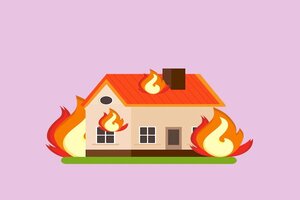
Fire safety at home
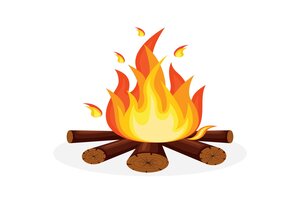
Fire safety outdoors - bonfires
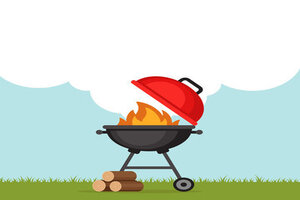
Fire safety outdoors – barbecues and chimineas
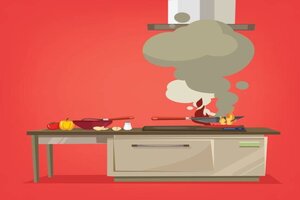
Cooking safely
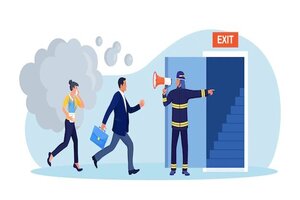
Escape plans
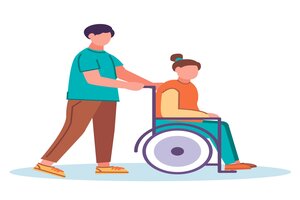
Fire safety for people with mobility issues



